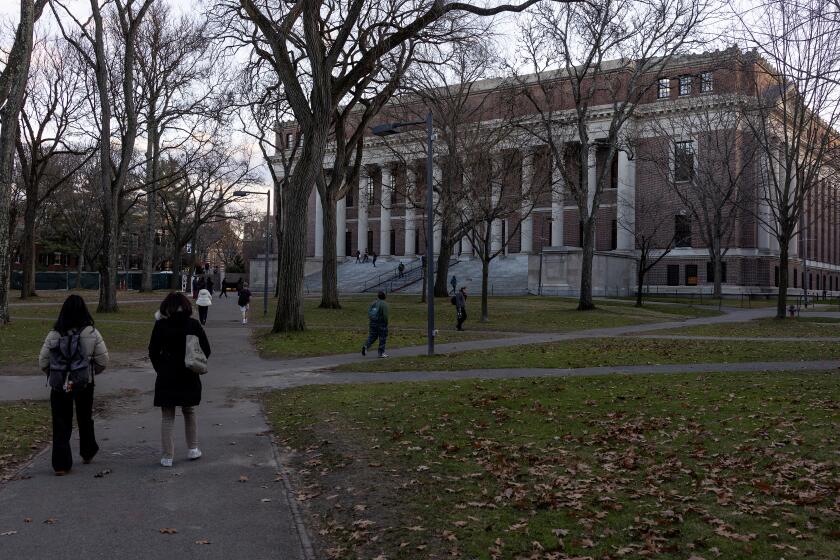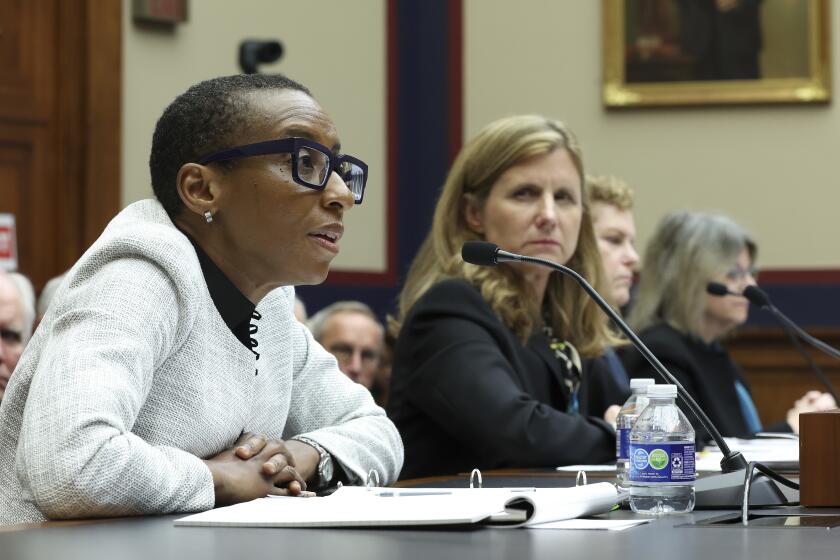Opinion: How the fight against antisemitism is now used to promote an ‘anti-woke’ agenda

- Share via
When feckless agitators accuse Derek Penslar of antisemitism, you know that something has gone way off the rails. We should be clear: What they are attacking is not just an eminent scholar, but more broadly, the American university as the site of expertise and critical thinking.
Penslar, a Harvard history professor, is the embodiment of expertise. He was appointed last week by that institution’s interim president, Alan Garber, to co-chair a task force on antisemitism at the university. In response to the announcement, right-wing media outlets including the New York Post and National Review reacted with indignation, suggesting that Penslar was not suitable for the task because, as the National Review said, he “has been critical of Israel.”
In this case — and in fact, with that particular accusation — we can see how transparently disingenuous such right-wing critics are. They often assert that criticism of Israeli governmental policy is not necessarily antisemitic. But either they don’t believe the claim they make or they deploy it strategically to advance their agenda of silencing those with whom they disagree.
Weak testimony from university presidents is just the latest evidence of the decline of higher education.
In Penslar, they’ve simply picked the wrong person. He is a deeply committed Jew and outstanding scholar who is widely known and respected for his judicious, kindly and unfailingly balanced nature. Over the course of his career, he has developed a reputation as one of the leading historians of Zionism in the world.
Penslar’s major works, from his first book “Zionism and Technocracy” to his most recent book “Zionism: An Emotional State,” are hallmarks of conceptual rigor, a careful sifting of evidence and clear writing. His reputation extends to Israel, where he is well known and widely admired by the scholarly establishment there. Indeed, he has been a major factor in the growth and expansion of Israel studies in North America and Europe.
A good deal of the energy behind the attack on Penslar results not from something he wrote but rather from something he signed: the “Elephant in the Room” letter, which attracted the support of nearly 3,000 scholars and intellectuals. Drafted in August, well before Oct. 7, the letter called on Israel to make meaningful moves toward democracy by bringing an end to the occupation of Palestinian territory.
In its two-tiered legal structure, strict movement controls and discriminatory land policies against Palestinians, the Israeli government has built a system that even some former Israeli officials describe as total apartheid.
The letter referred to Israeli control over the West Bank as “a regime of apartheid.” While this is undeniably sharp language, it captures the harsh and often brutal realities faced by Palestinians in the West Bank, who are denied access to the same rights, services and facilities as Israeli Jews who live there.
It is language that former Mossad director Tamir Pardo used to describe Israel’s stranglehold. And it is language that a good number of human rights organizations, including leading Israeli NGOs, have used themselves. These individuals and organizations refer to apartheid not because they are motivated by antisemitism, but because it is the word that they believe best describes the two-tiered system of justice with which Palestinians must live in the West Bank.
Into the fray have now stepped former Harvard President Lawrence Summers and Anti-Defamation League Chief Executive Jonathan Greenblatt, who both posted messages on social media critical of Penslar. Greenblatt accuses Penslar of being someone who “libels the Jewish state.” On Tuesday, Rep. Elise Stefanik (R-N.Y.) went beyond the pale in lambasting him for “his despicable antisemitic views and statements.”
Universities must keep students safe. But a broad new rule prohibiting ‘advocacy of genocide’ would not protect students and could be used against any group.
These critics don’t seem to care that they’re being used by right-wing actors such as Christopher Rufo and the Claremont Institute intent on attacking the “wokeness” of the American university and setting in place a new kind of institution marked by conservatism, lack of diversity and, frankly, mediocrity.
The strategy of these actors is to identify terms such as critical race theory, social justice and DEI (diversity, equity and inclusion), strip any nuance or virtue from them, and then use them to caricature fine colleges and universities as little more than “reeducation camps” in the mode of the Chinese Cultural Revolution.
For the likes of Rufo and the Claremont Institute, the aim is to reverse decades of multiculturalism, affirmative action and efforts at diversity that have deeply enriched American higher education. They prefer institutions such as Hillsdale College or the made-over New College that proudly eschew all forms of diversity in favor of a conservative, anti-woke ideological agenda.
Colleges and universities are not perfect institutions; they face their own challenges in navigating the boundary between free speech and respectful discourse. But those of us who care about the integrity and excellence of the higher education system in the U.S. need to awaken to the reality of the growing power of this right-wing campaign of destruction. The attacks on Derek Penslar that cast him as insufficiently attentive to antisemitism show how far this movement is willing to go. Its highly partisan agenda has already knocked off some large targets. Let’s not allow it to control the future of the American university.
David N. Myers holds the Kahn Chair in Jewish History at UCLA and directs the Luskin Center for History and Policy and the UCLA Initiative to Study Hate.
More to Read
A cure for the common opinion
Get thought-provoking perspectives with our weekly newsletter.
You may occasionally receive promotional content from the Los Angeles Times.













